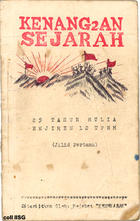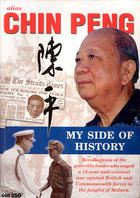 After the Second World War, the Malayan Communist Party (MCP) fought successively the British colonial government and the Malayan government. Support for the MCP came mainly from the ethnic Chinese in Malaya. The Malayan Liberation Army was the armed wing of the party. The Liberation Army was organized according to Marxist-Leninist principles, with commissars, political sections and a secret service. The army mainly consisted of Chinese regiments, but there was one Malayan regiment as well. This '10th regiment', established in 1949, recently donated its archives to the IISH.
After the Second World War, the Malayan Communist Party (MCP) fought successively the British colonial government and the Malayan government. Support for the MCP came mainly from the ethnic Chinese in Malaya. The Malayan Liberation Army was the armed wing of the party. The Liberation Army was organized according to Marxist-Leninist principles, with commissars, political sections and a secret service. The army mainly consisted of Chinese regiments, but there was one Malayan regiment as well. This '10th regiment', established in 1949, recently donated its archives to the IISH.
Emergency
During the Japanese invasion in 1941 members of the Communist Party of Malaysia (CPM) infiltrated from Singapore into Malaysia and started a war of resistance. They were trained and supported by the British. In the next few years this task force expanded to a guerrilla army of 9 - 10.000 soldiers called Malayan People's Anti-Japanese Army. At the conclusion of the Second World War the British once again took charge of local administration in Malaysia.![[The three sources and three component parts of marxism] Vladimir Il'ic Lenin 1981. From MLA archive.](https://archief.socialhistory.org/sites/default/files/styles/thumbnail/public/malayan-02.jpg?itok=KxZs_Yd-) In June 1948 the CPM decided to take up arms. After the killing of three British planters in 1948 and the High Commissioner in 1951, the CPM went underground. The hostilities were no longer called 'war', but 'Emergency' because planters knew that insurance companies would refuse to compensate for damage caused by an official 'war'.
In June 1948 the CPM decided to take up arms. After the killing of three British planters in 1948 and the High Commissioner in 1951, the CPM went underground. The hostilities were no longer called 'war', but 'Emergency' because planters knew that insurance companies would refuse to compensate for damage caused by an official 'war'.
In December 1955 peace negotiations started but the conditions of surrender were not acceptable to the CPM. The CPM leader Chin Peng fled to Thailand after these negotiations and Ah Hai was his stand-in in Malaysia.
Malaysia became independent on 31 August in 1957 under the leadership of the new Prime Minister Tunku Abdul Rahman. In 1959 the CPM gave up armed resistance and in 1960 the 'Emergency' ended.
Peoples Army
 In 1961 the CPM once again took up the fight. Secretary-general Chin Peng had left Thailand and settled in China.The Liberation Army no longer fought for national independence but now preached revolution. This included daily radio broadcasts by the party's radio station, Suara Revolusi Malaya (The Voice of the Malayan Revolution), operating from Hunan in southern China from November 1969. In 1981 the CPM was forced to stop broadcasting and the programs were now relayed from Thailand under the name Suara Demokrasi. In 1982 the 'Malayan People's Liberation Army' was renamed 'Malayan People's Army'. Plagued by internal strife and political cleansings in the early 1970s, the strength of the People's Army began to wane. On 2 December 1989, the communists and the governments of Malaysia and Thailand signed a peace treaty.
In 1961 the CPM once again took up the fight. Secretary-general Chin Peng had left Thailand and settled in China.The Liberation Army no longer fought for national independence but now preached revolution. This included daily radio broadcasts by the party's radio station, Suara Revolusi Malaya (The Voice of the Malayan Revolution), operating from Hunan in southern China from November 1969. In 1981 the CPM was forced to stop broadcasting and the programs were now relayed from Thailand under the name Suara Demokrasi. In 1982 the 'Malayan People's Liberation Army' was renamed 'Malayan People's Army'. Plagued by internal strife and political cleansings in the early 1970s, the strength of the People's Army began to wane. On 2 December 1989, the communists and the governments of Malaysia and Thailand signed a peace treaty.
Text by Eef Vermey
